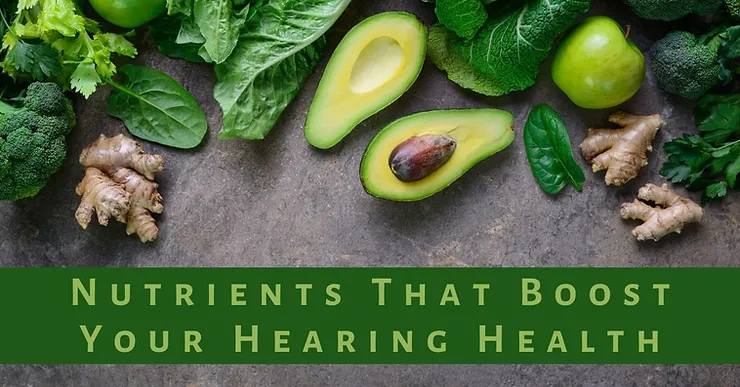
We know a safe, balanced diet promotes optimal wellness, from keeping down our blood sugar levels to raising our energy levels during the day. Do you know that our diet includes some nutrients that also help to improve our hearing health?
Here are some of the essential nutrients to consider when thinking of your hearing health.
Potassium
Potassium helps balance the blood and body fluids. It plays a significant role in your hearing safety, as your inner ear is filled with fluid.
Picking up sound waves, the inner ear hair cells collect the vibrations in the fluid and relay the impulses to the brain as electrical signals. The brain interprets and hears specific messages as sounds.
As we age, our levels of potassium can drop, affecting our ear health. To ensure you get enough potassium, eat fruits like bananas, melons, and oranges—other vegetables such as spinach, onions, and lima beans. Even yogurt and milk also contain high amounts of potassium.
Folate
Folate is excellent for so many things, including our ears! The vitamin, also known as vitamin B-9, helps our bodies produce red and white blood cells.
Research published in the American Journal of Clinical Nutrition in 1999 showed that older adults with severe hearing loss had serum folate rates 43 percent lower than average hearing people. A 2003 study also found that folate rates in patients with sensorineural hearing loss were substantially lower than those with no hearing impairment. And researchers found, in 2004, that men with age-related hearing loss had insufficient serum folate levels.
The facts speak for themselves, so make sure to add enough of this essential vitamin into your diet or take a supplement (folic acid is also the synthetic form of folate). Food is safer because an overdose of folate from food is harder to achieve. Foods that are rich in folate include spinach, asparagus, beans, broccoli, eggs, liver, nuts.
Vitamin B12
Research that linked low B-9 levels to hearing loss also found low B-12 levels appeared to contribute to hearing loss.
The hypothesis is that both folate and B12 deficiencies cause the body to increase homocysteine levels, and this, in effect, limits blood flow even to the cochlea. In the inner ear, cochlea transforms sound waves into electrical signals that are processed by the brain.
B12 naturally occurs in poultry, fish, eggs, dairy, and milk products.
Foods containing B12 also contain vitamin D that is important for hearing protection. Sunshine is the best source of vitamin D, but mackerel, tuna fish, egg yolks, and cheese–especially Swiss cheese are also good sources.
Omega-3 fatty acids
Omega-3 fatty acids have long been associated with good hearing, but most of us don’t get enough in our daily diets. A 2010 study published in the American Journal of Clinical Nutrition showed that study participants who had at least two portions of cold-water fish per week rich in omega-3s had a 42 percent lower chance of experiencing age-related hearing loss compared to those who had less than one piece of fish per week.
Many foods rich in omega-3 fatty acids include pastured eggs, flaxseeds, walnuts, and beef and lamb. Yet, of course, you cannot beat a good serving of salmon or sardines too.
Since other factors besides food affect hearing and there are no vitamins that lead to a direct improvement of hearing health, consuming a healthy diet is also the best way to get the nutrients that your body requires to function correctly. Before adding any vitamins or supplements to your diet, please check with your family doctor.
Eating the right foods not only can make you feel better, but it can also promote good hearing. But it isn’t enough. An annual hearing test is another essential way to preserve your hearing safety. If you’ve found that your hearing is changing, contact us today.
